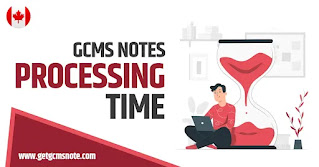Understanding GCMS Notes Processing Time: Tips and Insights
Introduction
When applying for immigration or visa processes in Canada, the wait for information and updates can be nerve-wracking. One critical aspect of this waiting time for GCMS Notes Processing Time. GCMS notes are essential documents that provide insight into your immigration or visa application status, detailing the steps taken by the Canadian immigration authorities in processing your case. In this comprehensive guide, we will delve into the intricacies of GCMS notes, discussing what they are, why they are important, how to request them, and most importantly, how long you can expect to wait for them.
What Are GCMS Notes?
GCMS notes, short for Global Case Management System notes, are detailed records kept by the Canadian immigration authorities during the processing of an immigration application. These notes provide an invaluable insight into the status of your application, the steps taken by immigration officers, and any issues or concerns they might have encountered during the processing.
GCMS notes contain information such as:
Application details: Including your personal information and application type.
Processing steps: Detailed records of the actions taken at various stages of your application's processing.
Officer's notes: Comments, observations, and decisions made by immigration officers reviewing your case.
Correspondence: Copies of any official communication between you and the immigration authorities.
These notes are crucial for applicants to understand the progress of their immigration application and, if necessary, address any concerns or discrepancies. They offer transparency and accountability in the immigration process, ensuring that decisions are made fairly and in accordance with Canadian immigration laws and policies.
Why Are GCMS Notes Important?
GCMS notes are of paramount importance for several reasons:
Transparency: They provide transparency in the application process, allowing applicants to track the progress of their case and understand the reasons behind decisions made by immigration officers.
Problem Identification: If there are issues or concerns with your application, GCMS notes can help identify them early so that you can take corrective actions or provide additional documentation as needed.
Legal Proceedings: In case of disputes or appeals, GCMS notes can serve as crucial evidence to support your case.
Peace of Mind: Having access to these notes can ease the anxiety associated with the uncertainty of the application process.
How to Request GCMS Notes
To request your GCMS notes, follow these steps:
Submit an Application: You need to submit an application under the Access to Information Act (ATIP) to request your GCMS notes. This application can be made online through the Immigration, Refugees, and Citizenship Canada (IRCC) website or by mail.
Pay the Fee: There is typically a processing fee associated with the request. As of my last knowledge update in September 2021, the fee was CAD $5.00. However, fees are subject to change, so it's essential to check the current fee on the IRCC website.
Provide Necessary Information: When submitting your request, ensure you provide accurate and complete information, including your full name, date of birth, UCI (Unique Client Identifier) number, and any other details related to your application.
Wait for Processing: After submitting your request, you will need to wait for the processing of your GCMS notes. The processing time can vary depending on various factors, which we will explore in detail later in this article.
Receive GCMS Notes: Once your request is processed, you will receive your GCMS notes via mail or email, depending on your chosen delivery method during the application.
Factors Affecting GCMS Notes Processing Time
The processing time for GCMS notes can vary significantly from case to case. Several factors influence how long it takes to receive your GCMS notes:
Workload: The workload of the immigration authorities can have a significant impact on processing times. During peak application periods, such as when there are policy changes or new immigration programs, processing times may be longer due to the increased volume of requests.
Complexity of Your Case: The complexity of your immigration application can affect processing times. If your case requires extensive review or if there are complications, it may take longer to compile and release your GCMS notes.
Volume of Requests: The number of GCMS notes requests in the queue can also affect processing times. If there is a backlog of requests, you may experience delays in receiving your notes.
Accuracy of Information: Providing accurate and complete information in your request is crucial. If there are discrepancies or missing information, it may take additional time to process your request.
Technical Issues: Occasionally, technical issues or system glitches can impact processing times. These issues may be temporary but can cause delays.
Postal Service Delays: If you choose to receive your GCMS notes by mail, postal service delays can affect delivery times.
Policy Changes: Changes in government policies or procedures related to GCMS notes requests can influence processing times. Be aware of any updates or changes that may affect your request.
Typical GCMS Notes Processing Time
While there is no fixed processing time for GCMS notes, there are some general guidelines that can give you an idea of what to expect:
Standard Processing Time: On average, it can take anywhere from 30 to 60 days or more to receive your GCMS notes. However, this is just an estimate, and actual processing times may vary.
Urgent Requests: In some cases, urgent requests may be processed more quickly. For example, if you are facing imminent immigration-related deadlines or legal proceedings, you can request expedited processing. Keep in mind that urgent requests are typically granted on a case-by-case basis.
Delays: Delays can occur for the reasons mentioned earlier, such as workload, complexity of the case, or technical issues. If your request is significantly delayed, you can follow up with the ATIP office for an update.
Holidays and Weekends: Processing times may be affected by holidays and weekends, as government offices may have reduced working hours or be closed on these days.
Tips for Expedited GCMS Notes Processing
If you are in a hurry to receive your GCMS notes, here are some tips that might help expedite the process:
Submit a Complete Application: Ensure that your ATIP application is complete and accurate. Any missing information or errors can lead to delays.
Include a Reason for Urgency: If you have a valid reason for needing the GCMS notes urgently, such as impending legal proceedings, make sure to include this information in your request. Clearly state why you require expedited processing.
Follow Up: If your request has been pending for an extended period and you have a valid reason for urgency, consider following up with the ATIP office. Politely inquire about the status of your request and reiterate the importance of receiving the notes promptly.
Check for Updates: Periodically check the IRCC website for updates on processing times and any changes in fees or procedures. Staying informed can help you plan accordingly.
Conclusion
The processing time for GCMS notes can be a source of anxiety for applicants waiting for updates on their immigration or visa applications. However, understanding the factors that influence processing times and following the tips mentioned in this guide can help you navigate the process more effectively.
Remember that while there are general guidelines for processing times, individual cases can vary, and patience is often key when dealing with immigration-related matters. Be proactive in monitoring the status of your request, and if you have a valid reason for urgency, don't hesitate to communicate it to the relevant authorities.
Receiving your GCMS notes can provide valuable insights into your application's status, allowing you to make informed decisions and take appropriate actions if needed. So, stay informed, be patient, and use this information to your advantage as you navigate the Canadian immigration system.



Comments
Post a Comment